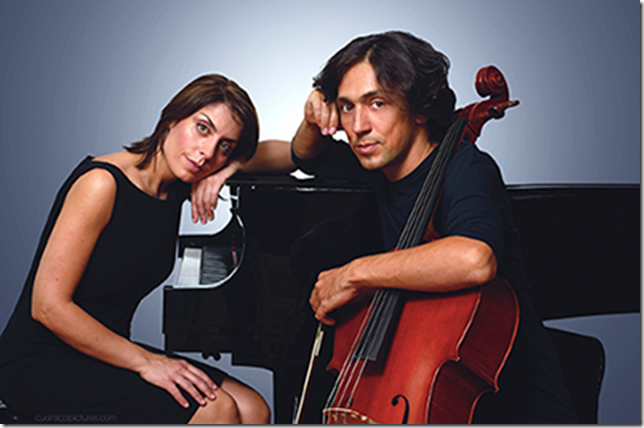The cellist Ian Maksin first became well-known to South Florida audiences as the original cellist of the Delray String Quartet and principal cellist of the New World Symphony and Atlantic Classical Orchestra before he left the area for Chicago and new opportunities.
The Russian-born Maksin returned Sunday afternoon for a recital with his duo partner, the Bulgarian pianist Ani Gogova, also resident in Chicago, at St. Paul’s Episcopal Church in Delray Beach. As the Ian & and Ani Duo, the two have concertized frequently while also pursuing solo projects. Their most recent recording, Tango Plus, features music of Piazzolla, Ginastera, Shchedrin and Chicago’s own Ilya Levinson.
A couple of those pieces made it onto Sunday’s program, which opened in much more traditional style with the Cello Sonata No. 2 (in G minor, Op. 5, No. 2) of Beethoven. This was a very straightforward, deeply felt reading of this sonata, which is bursting with the kind of youthful energy that was to bear much more ambitious fruit in the symphonies to come.
One of the first things that was evident was that these two musicians have played with each other frequently. This is clearly a partnership of long standing, with Maksin and Gogova completely in synch with each other’s performance. Maksin has a soulful tone, the kind we associate with the Russian school of string performance, and it came through even in the strictures of early Beethoven. Gogova has an accurate, reliable technique, and it was a pleasure to hear all those triplets in the second movement rolling down like water, sounding natural and never like they were a strain.
They took the first movement, a longish sojourn in the world of the Handelian French overture, quite slowly and soberly, setting the ear up for strong contrast in the swift movement that followed. Maksin played the second movement with a firmness of attack that differentiated it from the piano enough to make it stand out in high relief, and in the third movement, the two musicians joined winningly in the music’s lightheartedness and spirit of fun. In all, a polished, elegant and attractive performance of this sonata.
The Beethoven was followed by Astor Piazzolla’s most popular tango, Oblivion, which Maksin played with beautiful and penetrating tone, full of the music’s native melancholy. The duo then added Arvo Pärt’s Spiegel im Spiegel as an addition to the printed program; this most well-known of all of Pärt’s pieces is particularly popular with dance companies, who find its serene stasis ideal for choreographic purposes.
Gogova and Maksin played this very quietly; indeed, too quietly. While Gogova set up the broken F major chords in hushed fashion, Maksin came in the same way, playing sotto voce the whole way through. It was fascinating, but not entirely successful. The piece works a little better if the scalar melody sings out; that way the endlessness of the material can be heard to equal effect in both instruments.
Much the same introspective mood continued with the next selection, three of the Five Hebraic Pieces of the Swiss-American composer Ernest Bloch. Maksin clearly has a profound connection to this music, imbuing the three selections — “Prayer,” “Supplication” and “Jewish Song” — with an intense vibrato and looseness of hand that let the instrumental cantillations sound improvised rather than written out.
Bartók’s popular Romanian Dances came next, changing the mood of this concert quite a bit, and giving the two a chance to show the more athletic sides of their personalities. This charming and brilliant piece was powerfully played, from the forcefulness of the “Stick Dance” that opens the piece to the runaway joyousness of the “Romanian Polka” and “Short Steps” with which it ends. This is also a piece that requires the two musicians to be very aware of what each other is doing and work as partners rather than as soloist and accompanist, and that’s exactly what happened here.
After the sparkle of the Bartok, Maksin and Gogova closed the recital with “In the Style of Albeniz,” an evocation (originally for violin) of the Spanish composer’s work by the contemporary Russian composer Rodion Shchedrin. It’s fun, noisy and exciting, and the two musicians played with fire and gusto, earning generous applause from Sunday’s audience.
Maksin will be back in his old stomping grounds in March to play Tchaikovsky’s Rococo Variations with Elaine Rinaldi’s Orchestra Miami, and if you missed him this time, it will be worth your time to catch him in an orchestral setting. Here’s hoping, too, that he comes back in the future with Gogova for another recital that effectively blends showpieces and deeply serious works, as this one did, in such an enjoyable fashion.
Ian Maksin will be joined by Ani Gogova, legendary Chicago bluesman Corky Siegel and guitarist Goran Ivanovic in a concert broadcast live today at 3 p.m. EST on Chicago’s WMFT-FM (www.wfmt.com).
